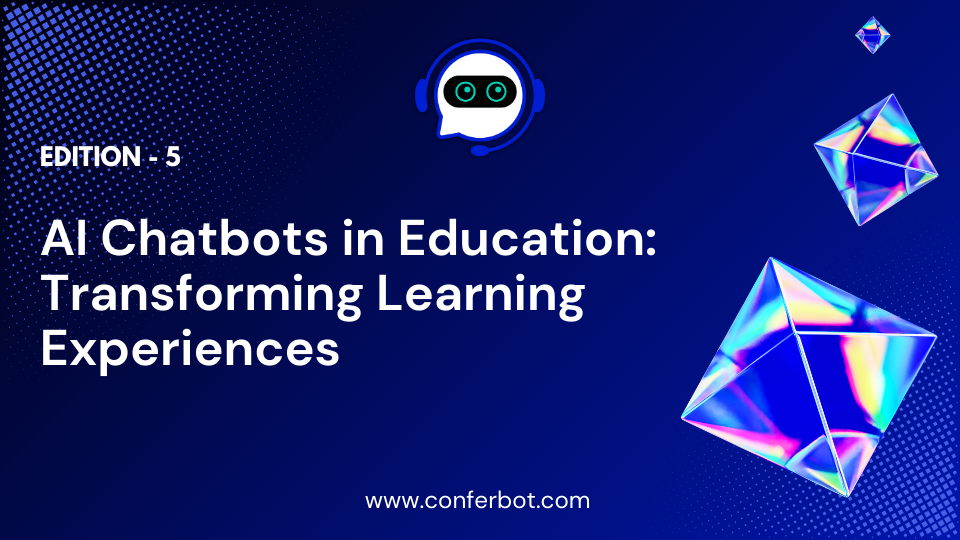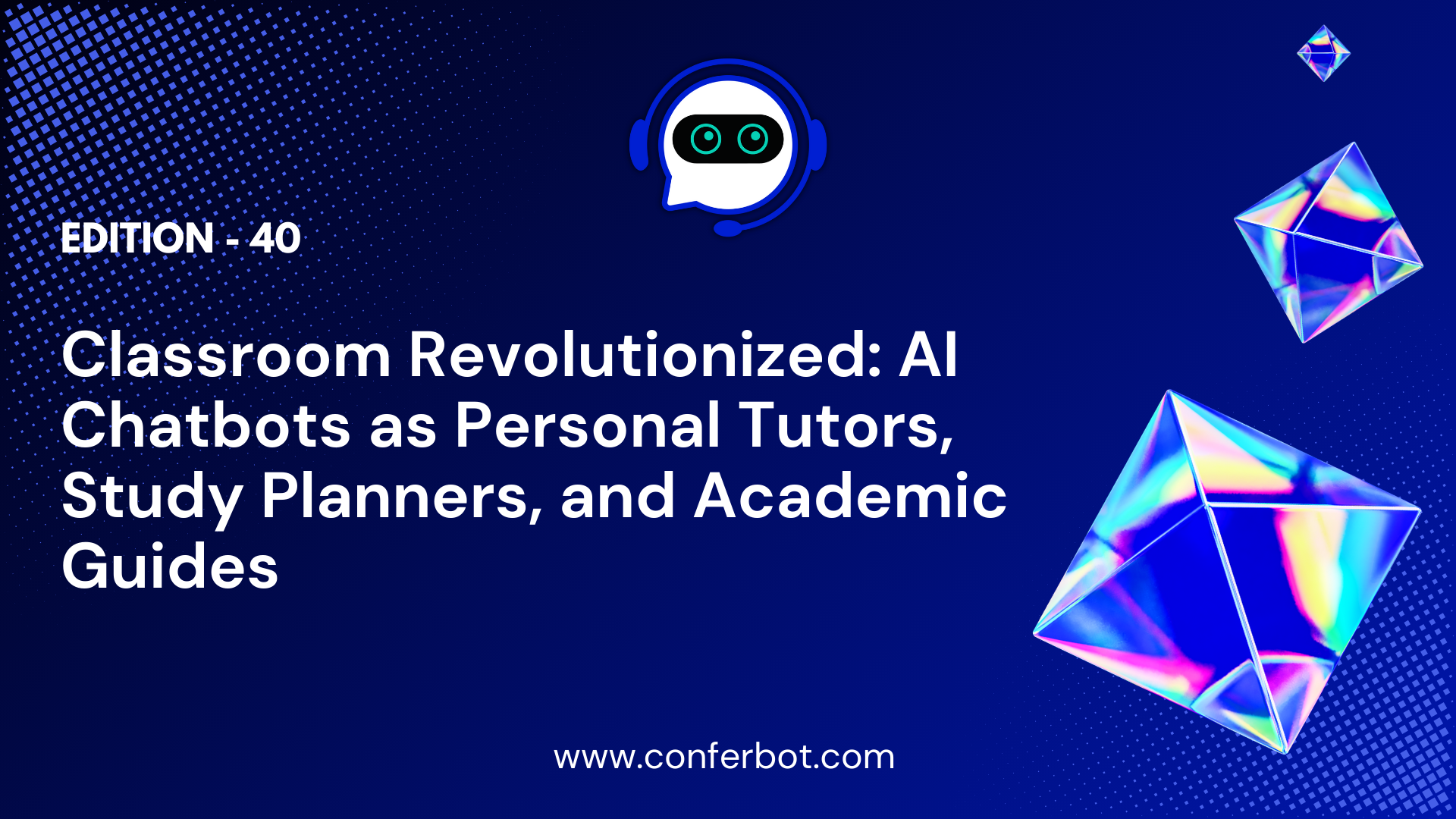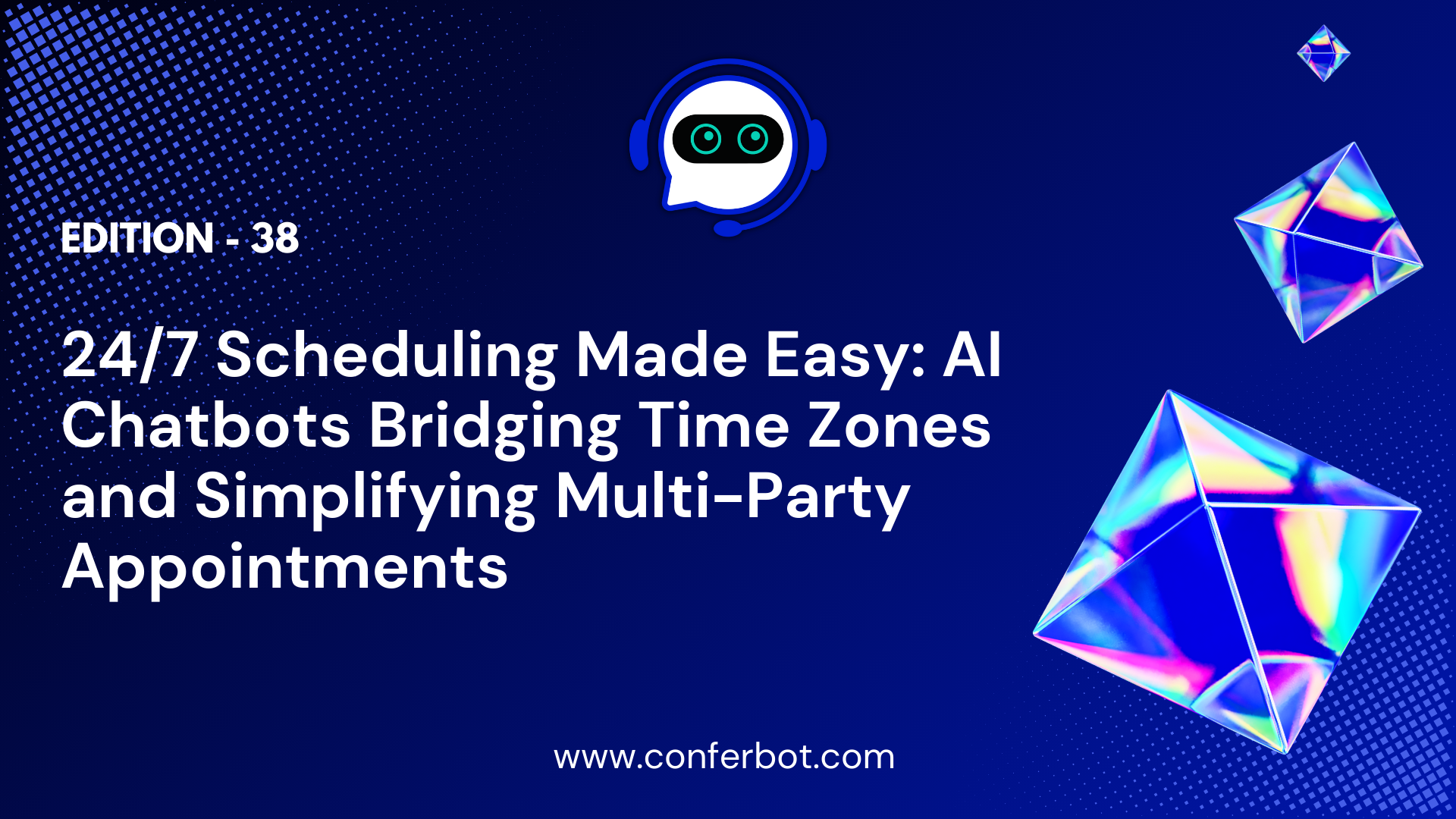
AI Chatbots in Education: Transforming Learning Experiences
Discover how AI chatbots are revolutionizing education, enabling personalized learning, streamlining administrative tasks, and enhancing accessibility in our latest Insights on Chatbots & AI edition.

Welcome to the fifth edition of Insights on Chatbots & AI, where we explore the transformative impact of artificial intelligence and chatbots within the realm of education. This comprehensive issue delves into how these cutting-edge technologies are pioneering a paradigm shift in the way knowledge is acquired, retained, and applied, ultimately redefining learning experiences for students and educators alike.
AI Chatbots: Personalizing the Learning Journey
The integration of intelligent AI chatbots into educational settings has the potential to revolutionize the way students learn by delivering personalized, adaptive, and immersive learning experiences tailored to their unique needs, learning styles, and pace of progress. This personalized approach addresses one of the longstanding challenges in traditional educational systems, where a one-size-fits-all approach often fails to cater to the diverse learning requirements of individual students.
AI chatbots leverage advanced natural language processing (NLP) and machine learning capabilities to analyze student responses, identify knowledge gaps, and adapt their teaching approach accordingly. By continuously assessing a student's understanding and adjusting the level of difficulty, pacing, and instructional methods, these chatbots ensure that each learner receives the appropriate level of support and challenge to maximize their comprehension and retention.
Moreover, AI chatbots can facilitate interactive and engaging learning experiences by incorporating gamification elements, simulations, and multimedia resources. This immersive and dynamic approach not only captivates students' attention but also encourages active participation, fostering a more enjoyable and effective learning environment that aligns with the preferences and learning styles of today's digital-native generation.
One of the primary advantages of AI chatbots in education is their ability to provide real-time support and guidance, acting as virtual tutors that are available 24/7 to assist students with concept explanations, answer queries, and offer personalized feedback and recommendations. This round-the-clock availability ensures that students can receive the support they need, when they need it, without the constraints of traditional classroom schedules or limited educator availability.
Streamlining Administrative Tasks and Student Support Services
Beyond their direct impact on learning, AI chatbots are proving invaluable in streamlining administrative tasks and student support services within educational institutions. By automating routine inquiries related to course registration, scheduling, financial aid, and general information, chatbots can alleviate the workload on administrative staff, allowing them to focus their efforts on more complex tasks that require human intervention and specialized expertise.
Additionally, chatbots can serve as virtual assistants for students, providing guidance on academic resources, study strategies, campus services, and career planning. This level of comprehensive support ensures that learners have access to the information and resources they need to navigate their educational journey successfully, addressing potential barriers or challenges promptly and efficiently.
By offering round-the-clock support and accessible information, chatbots contribute to better student retention rates, academic success, and overall satisfaction with the educational experience. Students no longer have to navigate complex bureaucracies or wait for limited office hours, as the chatbot becomes a reliable and always-available source of support and guidance.
Enhancing Accessibility and Inclusivity in Education
One of the most significant advantages of leveraging AI chatbots in education is their ability to promote accessibility and inclusivity for learners with diverse abilities and backgrounds. By offering multi-language support and leveraging assistive technologies, chatbots can bridge communication gaps and cater to the unique needs of students with disabilities, learning differences, or language barriers.
For instance, chatbots can be integrated with text-to-speech and speech-to-text capabilities, enabling students with visual or auditory impairments to engage with educational content and receive support in a more accessible manner. Additionally, chatbots can be programmed to recognize and respond to different communication styles, ensuring that learners from diverse cultural backgrounds or with neurodivergent conditions can receive tailored support that resonates with their unique needs.
Furthermore, AI chatbots can adapt their language and instructional methods to accommodate different learning preferences and cognitive styles. For example, some students may benefit from a more visual approach, while others may thrive with auditory or kinesthetic learning techniques. By leveraging data-driven insights and personalization algorithms, chatbots can dynamically adjust their teaching strategies to align with each student's optimal learning modality.
By fostering an inclusive and accessible learning environment, AI chatbots can empower students who may have previously faced barriers, unlocking their full potential and ensuring that education remains a fundamental right for all, regardless of individual differences or circumstances.
Spotlight on Conferbot: Pioneering AI-Driven Learning Solutions
In the rapidly evolving edtech landscape, Conferbot stands out as a pioneering platform dedicated to leveraging the power of AI and chatbots to transform educational experiences. With its advanced natural language processing capabilities and adaptive learning algorithms, Conferbot's chatbots are designed to provide personalized, engaging, and inclusive learning support to students of all ages and backgrounds.
One of Conferbot's key strengths lies in its ability to seamlessly integrate with existing learning management systems (LMS) and educational platforms, ensuring a seamless flow of data and enabling chatbots to access and leverage student performance data, curriculum resources, and assessment tools. This deep integration allows Conferbot's chatbots to deliver tailored learning experiences that are directly aligned with the specific curriculum, learning objectives, and instructional methodologies adopted by educational institutions.
Furthermore, Conferbot's chatbots are built with a deep understanding of pedagogical best practices, incorporating proven teaching methodologies and instructional design principles to ensure that the learning support provided aligns with established educational standards and promotes effective knowledge acquisition and retention. This commitment to sound educational principles sets Conferbot apart, ensuring that its chatbot solutions are not mere technological gimmicks but rather powerful tools grounded in evidence-based teaching strategies.
Conferbot also offers robust analytics tools that provide educators and administrators with valuable insights into student performance, engagement levels, and areas of strength or weakness. These data-driven insights empower educators to make informed decisions, refine their teaching strategies, and identify opportunities for intervention or additional support, ultimately enhancing student outcomes and driving continuous improvement within the educational ecosystem.
In this spotlight section, we'll explore Conferbot's innovative features, success stories, and the transformative impact its chatbots are having on learning experiences across various educational settings, from K-12 classrooms to higher education institutions and corporate training programs.
Conclusion
As we conclude this edition of Insights on Chatbots & AI, it is evident that the integration of AI chatbots within educational settings holds immense potential for transforming the way knowledge is acquired, retained, and applied. From personalized learning experiences and streamlined administrative tasks to enhanced accessibility and inclusivity, these intelligent assistants are reshaping the educational landscape, empowering students and educators alike to achieve unprecedented levels of success.
The strategies and insights discussed in this issue underscore the transformative impact of AI chatbots across various educational contexts, from primary schools to universities and corporate training programs. As educational institutions continue to embrace the power of AI, machine learning, and natural language processing, the role of chatbots in facilitating dynamic and engaging learning experiences will only grow more significant, making them essential tools in the pursuit of educational excellence.
However, it is crucial to approach the implementation of AI chatbots in education with a commitment to continuous improvement, adaptation, and alignment with evolving pedagogical practices and technological advancements. By fostering a culture of innovation and collaboration between educators, technologists, and policymakers, we can ensure that the integration of chatbots remains grounded in sound educational principles and ethical practices, prioritizing student well-being and academic integrity.
Looking ahead, our next edition will explore the role of AI chatbots in fostering workplace productivity and collaboration. We will delve into how these intelligent assistants are revolutionizing the way teams communicate, share knowledge, and manage tasks, enabling more efficient and streamlined workflows across various industries and organizations.
Reference:https://www.linkedin.com/pulse/revolutionizing-education-ai-chatbots-transforming-learning-2yqrf/
Tags :
no-code chatbot ai chatbbots no-code chatbot free chatbot builder conferbot innovation customer engagement chatbot technology
The Conferbot Team
About AuthorHi there! I'm Conferbot, a simple and powerful tool that enables you to create chatbots for your website in minutes.
Try me out and see how I can help make your work life easier, just like I have for 10k+ satisfied users worldwide.


